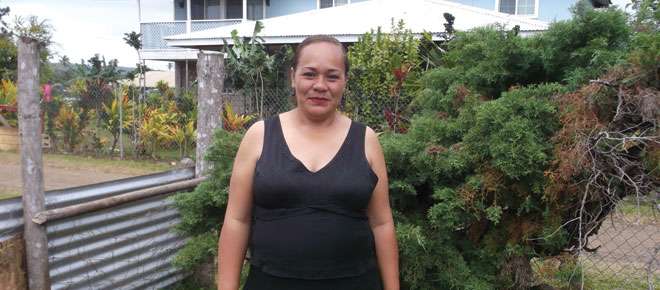Malina Hautau’s entrepreneurial eye spotted an opportunity to turn waste coconut into a source of income.

Malina Hautau’s entrepreneurial eye spotted an opportunity to turn waste coconut into a source of income.
Malina oversees the process of transforming coconuts into high-end virgin coconut oil at the Tonga National Youth Congress (TNYC) site on Eua.
The abundant coconut has many uses and nothing is wasted when it’s turned into oil: husks are used to fire up the coconut driers, pressed coconut is used as animal food and the shells are turned into kava cups. But with Oxfam’s support Malina is developing an offshoot business that uses the dried coconut shreds to generate an extra income.
Malina’s story
Malina is 38 years old and lives in the village of Kolomaile on Eua island, a two hour ferry journey from Nuku’alofa. There is a small, growing tourism industry but most people rely on the fertile volcanic soil for a living, selling crops to one another.
Malina has two daughters to support. One is four, and the other, who is six, attends primary school. Her family used to depend upon Malina’s husband for money. As the sole breadwinner, he earned his living by selling the vegetables from his garden to local people, supplementing his income by selling kava. Kava fetches a good price, but it takes three years for the plant to be ready for harvest so cash rewards are infrequent.
Stepping up with Oxfam
 When the TNYC’s virgin coconut oil scheme began, Malina helped out by cooking for the workers on the nearby site. She knew she could contribute to the oil processing and asked to join the group and work there.
When the TNYC’s virgin coconut oil scheme began, Malina helped out by cooking for the workers on the nearby site. She knew she could contribute to the oil processing and asked to join the group and work there.
The TNYC took her on board and Malina is currently the only woman on the team of five full-time employees. Her job is to supervise the daily operations of the site, for which she is paid TOP$80.00 (NZ$56) per week from the sales of the oil. She is incredibly happy because this is the first time she has been able to contribute to her family’s income. The average weekly wage in Tonga is NZ$47*.
Culinary inspiration
During her time on site Malina noticed how her colleagues utilised every part of the coconut. But instead of feeding their animals with waste shredded coconut, Malina saw an opportunity to use it in cake decorating.
With the help of TNYC Malina takes the dried dessicated coconut home, dyes it, and uses it to decorate cakes and biscuits that she and local women have baked using TNYC coconut oil. The women sell the popular treats to families and organisations across the island, using the money they earn to help pay for essentials like their children’s school fees or investing in better tools for their gardens.
Malina’s salary from TNYC’s virgin coconut oil supports her venture and there is little doubt in her mind that if it wasn’t for the opportunity she was given by TNYC, she would never be working in a business where profits are channelled back into helping her island community.
Using local resources
Malina wants to help younger girls involved in TNYC and is giving her time to support and mentor them. Along with her friends, she would like to purchase a sander and specialist equipment that will help them turn coconut shells into kiekie, wrap-like adornments worn around the waist by women as part of Tongan traditional dress. Malina’s dream is to see this project flourish and involve as many of the local girls as possible.
With your support, Oxfam can continue helping people like Malina support themselves and their families.
*Source: UNData



